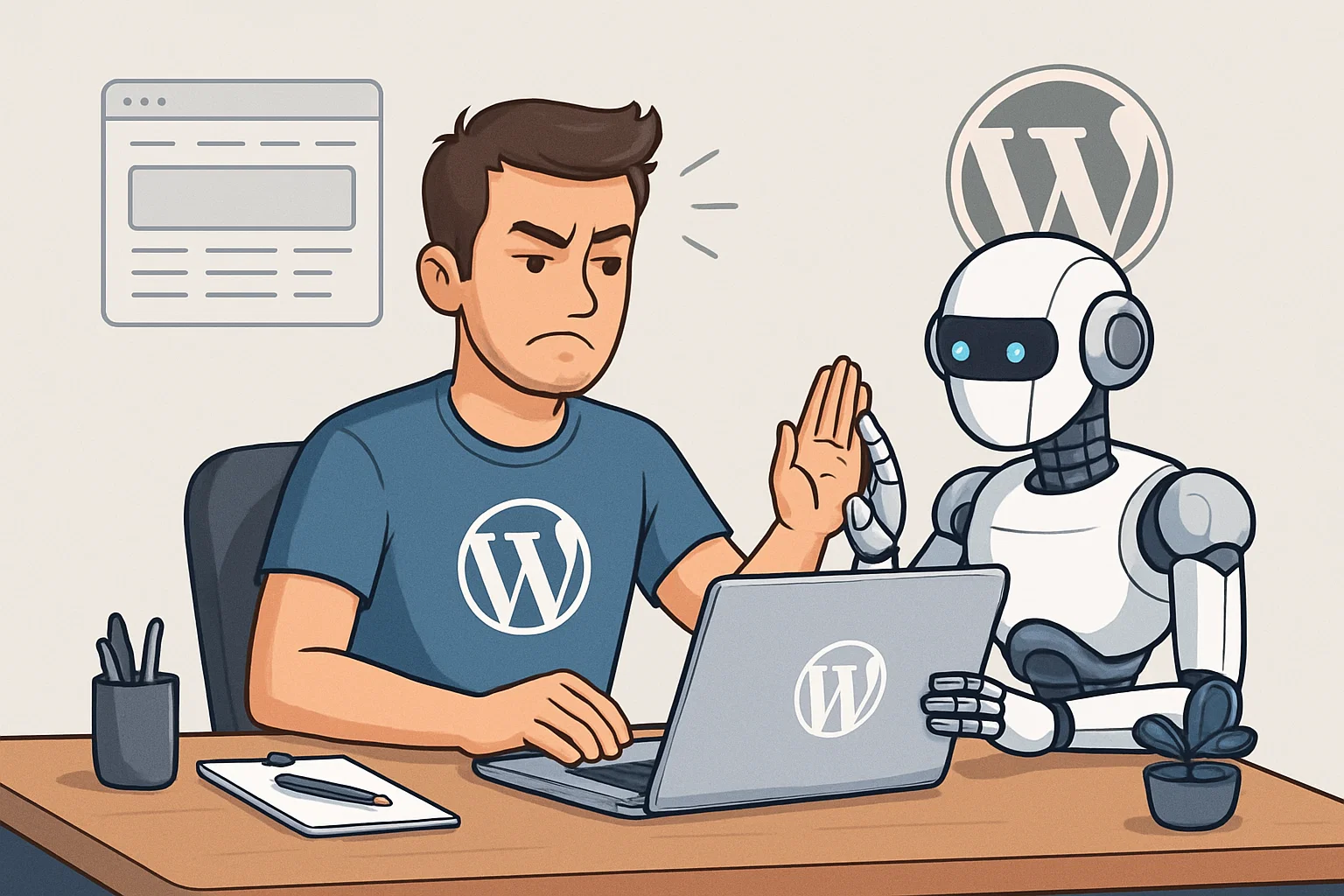
Artificial Intelligence (AI) tools have made significant progress in recent years. They can generate text, create layouts, and even produce basic websites in minutes. However, as an experienced WordPress webmaster, I can confidently say that AI is still far from replacing the skills, judgment, and precision of a human professional.
While AI can be a helpful assistant, building a successful, functional, and optimized website requires more than just clicking a button. Here’s why.
SEO Is Not Just About Keywords
Many AI-based website builders can automatically place keywords in text, but real Search Engine Optimization (SEO) is much more complex.
Professional webmasters understand that ranking in Google requires:
- Technical SEO: site speed optimization, correct use of structured data, mobile responsiveness, and proper indexing rules.
- Content Strategy: creating unique, high-quality, and relevant content targeted at the right audience.
- On-Page Optimization: crafting meta titles, descriptions, heading structures, and internal linking strategies that match search intent.
- Image Optimization: selecting the correct image format (WebP, PNG, JPEG), compressing files without losing quality, and adding descriptive alt text.
AI can suggest keywords, but it does not reliably manage the entire SEO ecosystem needed for long-term success.
Design Is About Experience, Not Just Layout
AI can create a template, but design is more than just arranging blocks on a page. A professional WordPress webmaster considers:
- User Experience (UX): how a visitor navigates, where their eyes go first, and what encourages them to take action.
- Brand Consistency: matching colors, typography, and imagery to a company’s identity.
- Conversion Optimization: adjusting button sizes, placement, and calls to action to increase leads or sales.
- Cross-Browser Testing: ensuring the site looks perfect in Chrome, Safari, Firefox, and on mobile devices.
AI lacks the human perception needed to fine-tune these details. For example, knowing when a hero image is too heavy and slows the page, or when a call-to-action button blends into the background, comes only with experience.
Real Websites Need Real Problem-Solving
AI tools follow patterns, but websites often require custom solutions:
- Fixing plugin conflicts that break site functionality.
- Debugging PHP errors after updates.
- Implementing advanced features like custom post types, membership systems, or API integrations.
- Adjusting server configurations for optimal performance.
These are not “one-click” tasks. They require analytical thinking, coding knowledge, and sometimes direct communication with hosting providers.
Image Selection, Size, and Format Matter More Than People Think
A professional webmaster knows that a slow-loading site can kill rankings and conversions. Choosing the right image size and format is not trivial:
- Large images may look beautiful but slow down load time.
- Incorrect aspect ratios can ruin the layout.
- Different sections require different formats — WebP for performance, SVG for icons, PNG for transparency.
- Proper naming and alt tags help SEO and accessibility.
AI can resize images, but it cannot yet consistently make strategic decisions that balance quality, performance, and branding.
AI Lacks Business Context
A great website reflects the business strategy behind it. AI doesn’t understand:
- Your competitive landscape.
- Local market preferences.
- The emotional triggers of your target audience.
- The subtleties of cultural adaptation in design and content.
A skilled webmaster works closely with clients to tailor every decision — from menu structure to call-to-action placement — to achieve specific business goals.
Ongoing Website Management Is Not Automated
Creating a site is just the beginning. A successful website needs:
- Regular security updates to WordPress core, themes, and plugins.
- Backups and restoration planning.
- Content updates for SEO relevance.
- Performance monitoring and improvements.
- A/B testing to improve conversions.
AI doesn’t take responsibility for these tasks — but a webmaster does.
AI is an excellent assistant for webmasters. It can speed up repetitive work, suggest ideas, and automate simple tasks. But the expert judgment, problem-solving, and strategic thinking required to build, maintain, and grow a website cannot be fully automated.
In the same way that having Photoshop doesn’t make someone a professional designer, having AI doesn’t make someone a professional webmaster.
For businesses that value results — high search rankings, a polished brand image, and a site that converts visitors into customers — the skills of an experienced WordPress professional will remain essential for many years to come.



